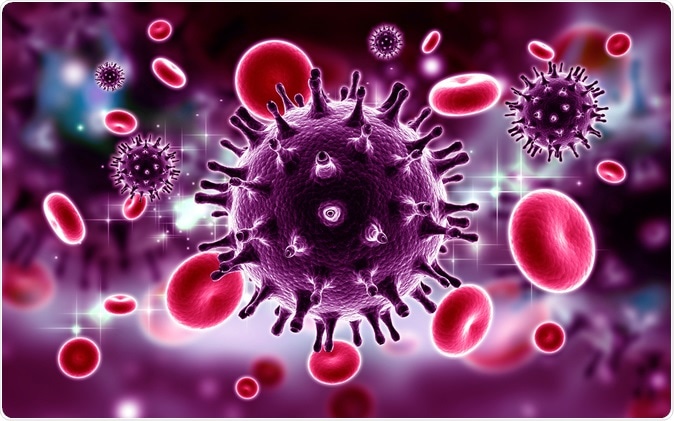There has been a four decades long challenge to develop a vaccine against the deadly HIV virus that causes AIDS. Last Saturday the research bore fruit when a team of scientists announced that a trial drug has shown immune response in humans and also protected laboratory monkeys from HIV infection.

3d rendered HIV Virus in Blood Stream in color background. Image Credit: RAJ CREATIONZS
During the initial stages of the drug testing, the researchers have found that the drug can trigger an immune response when administered to humans. This immune response could protect the humans from the infection. They also tried the drug on 72 laboratory monkeys and proceeded to infect them with six injections of HIV like viruses. Two thirds of the tested monkeys’ immune systems resisted the incoming infection proving the vaccine successful in them. In early human trials the vaccine has been found to be safe in humans.
The study results from these early trials have been published in the latest issue of the Lancet. The team tested this new agent on 393 healthy, HIV-free adults from East Africa, South Africa, Rwanda, Uganda, United States and Thailand between ages of 18 and 50 years. All of the participants were randomly divided into seven groups and administered severe different vaccine combinations or a placebo. This is called a “mosaic” of vaccines. They were administered 4 injections over a period of 48 weeks and their immune system response was noted. According to the study authors, the vaccine produced “robust (high levels of) immune responses” in the participants. Only five of the recipients of the vaccine reported side effects such as dizziness, diarrhoea, stomach pain, low back pain etc.
Now it is to move on to the next stage of human clinical trials wherein it would be tested on 2,600 women in southern Africa to check if it prevents HIV infection in them. The drug is named HVTN705 is called “Imbokodo” (meaning the ‘rock’ in Zulu). It is still too early to speculate that it would work with 100 percent success say the researchers but they are hopeful. Study leader Dan Barouch, a Harvard Medical School professor said that the results till now are “promising” but it is best to be “cautious”. He explained that more data needs to come in from human trials to deem this as safe and protective against HIV infection. The results from the upcoming trials on humans are expected to arrive by around 2021 or 2022.
Barouch reminded that this is the “fifth HIV vaccine concept” that has been tested in the four decades of the advent of HIV. The last promising molecule was RV144 in 2009 that reduced the risk of HIV infection in over 16000 Thai individuals by 31.2 per cent. The achievement was considered to be too small for the drug to go ahead and come into the market as a HIV vaccine.
HIV has infected around 80 million people worldwide since it was first detected in the 1980’s. At present around 37 million individuals are living with HIV/AIDS with 1.8 million new infections and 1 million deaths annually says the World Health Organization.
This study was funded by Janssen Vaccines & Prevention BV along with International AIDS Vaccine Initiative among others.
Source:
https://doi.org/10.1016/S0140-6736(18)31364-3